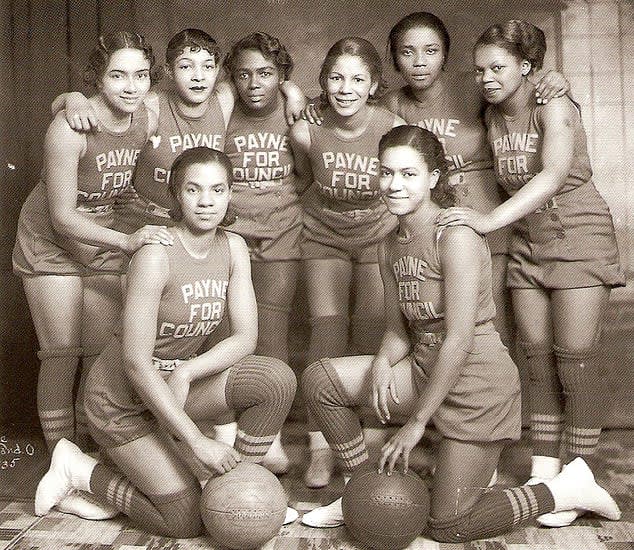In 1935, Lawrence O Payne was running for reelection to the Cleveland City Council. He sponsored a women’s basketball team in the area, donning them in uniforms with “PAYNE FOR COUNCIL” plastered on the front.
Lawrence O Payne was born in Columbus, Ohio, on Oct. 11, 1892, and after serving in the army during World War I, he settled north in Cleveland. He earned admittance to the Ohio bar and was appointed as Cleveland’s first Black assistant police prosecutor. In 1929, he was elected to city council in an important sweeping of power for the Black community in the city. Lawrence O Payne died Sept. 26, 1959, after serving in public office until 1945 and spending his remaining years in private practice.
One member of Lawrence O Payne’s recreational team was Jean Murrell Capers (back row, far left). Despite her small stature, she was an athletic standout, excelling in basketball as well as tennis. Her sister Alice also joined her on the squad’s roster (front row, far right).
Capers, who added the last name in 1943 when she married her second husband Clifford, graduated from Case Western Reserve University in 1932 with a degree in education and began teaching physical education in Cleveland schools. Within a few years, she grew tired of the work and set her sights on politics, with her main goal to sit on the Cleveland City Council.
She first ran for city council in 1943, submitting her name as a write-in candidate. With a win, she would be the first Black female member of the city council.
“Other than my parents, who encouraged me to run, most [others] said, ‘No, don’t run,’” she told Case Western Reserve’s THINK Magazine.
She lost, and in the next six years, Capers would try and lose two more times. But in 1949, the fourth time became the charm, and she achieved her goal, following in the footsteps of the man whose team she played on 14 years previously.
More on Jean Murrell Capers
When she in her final year as a student at Case Western Reserve, a list of Black female seniors was posted on a board telling them to see the assistant dean, Capers told THINK Magazine.
“The [assistant] dean told us we were not to attend the annual prom,” Capers recalled to the magazine. “We knew about prejudice because it was in our everyday living. But for Western Reserve, the prestige and culture that it represented, why, it was just shocking.”
After talking through the situation with friends and families within the community, Capers said she went to the dance with a date and had all the fun she was originally planning on.
“There was nothing brave about it,” she explained. “I was a citizen. I was going to school to get rid of ignorance.”
After he time on the city council, Capers maintained her fight and remained an important voice for civil rights in Cleveland and beyond. In 1955, JET Magazine called her “the country’s No. 1 Negro woman Democrat, and in after losing reelection in 1959, continued in politics as Ohio’s Assistant Attorney General and later a special assistant to the Attorney General. Capers was an original member of the Women’s Advisory Council of Employment Services and contributed greatly to the Central Welfare Association and National Council of Negro Women.
Capers was integral in Carl Stokes’s run for Cleveland mayor in 1965, and although he lost, the campaign propels him for a successful second attempt two years later, making him the first Black mayor of a major American city.
In 1977, Capers was appointed to the municipal court and won reelection until she stepped aside in 1986 only because Ohio law required judges to retire at 70. She continued her work after leaving public office, practicing law and keeping her license active into her 90s.
For all of her work for equality and public service, Capers was inducted into the Ohio Women’s Hall of Fame and the Ohio Civil Rights Hall of Fame. She passed away July 18, 2017, at the age of 104.
Photo: Allen Cole, 1935
This article was originally published Feb. 28, 2019.







